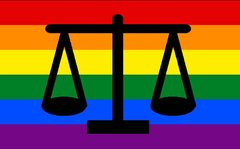New FLAC LGBTQI+ Clinic
Following once-off funding awarded by the Department of Children, Equality, Disability, Integration and Youth through the LGBTQI+ Funding Scheme supporting community services, FLAC is undertaking a project exploring unmet legal need in the LGBTQI+ community in Ireland. FLAC has held pop-up LGBTQI+ clinics in the past and we hope to build on this, and the legal services we provide through our phone line and in our general clinics. The funding was awarded to identify the extent of unmet legal need within the LGBTQ community and to prepare a report into how this could be addressed through the provision of dedicated legal services, information and training.
LGBTQI+ people disproportionately experience discrimination and social exclusion in employment, education, housing and other areas. Compounded experiences of disadvantage and, often, overlapping and intersecting identities can increase legal needs. This project has a number of strands including compiling a research report on unmet legal needs in the LGBTQI+ Community, with a particular focus on vulnerable and marginalised people, as well as hosting roundtable discussion events on the experiences of unmet legal needs. FLAC will also be circulating a survey that will provide a mechanism for people to share some of their experiences.
Additionally, we have established a pilot free legal advice and advocacy service in the form of an LGBTQI+ clinic based in FLAC. This clinic will provide much needed tailored legal advice and information to LGBTQI+ individuals, as well as informing the overall research report. Individuals can access the service when referred by other organisations and groups we are working with. Any group who wants to be able to refer service users or members to the LGBTQI+ clinic can contact FLAC for a referral form.
Through this project, FLAC is aiming to assess how how best to ensure the LGBTQI+ community has relevant and accurate information in relation to their legal rights, including under the relevant equality frameworks and that the community has access to relevant legal advice and representation in respect of wider issues impacting on the community such as in the area of family law and gender recognition and access to healthcare
Resources
- Resources
- Bulletin
- 2026 Archive 3 issues
- 2025 Archive 23 issues
- 2024 Archive 24 issues
- 2023 Archive 23 issues
- 2022 Archive 25 issues
- 2021 Archive 24 issues
- 2020 Archive 25 issues
- 2019 Archive 24 issues
- 2018 Archive 24 issues
- 2017 Archive 25 issues
- 2016 Archive 20 issues
- 2015 Archive 25 issues
- 2014 Archive 26 issues
- 2013 Archive 29 issues
- 2012 Archive 29 issues
- 2011 Archive 27 issues
- 2010 Archive 12 issues
- Case Studies
- All-Ireland NGO Legal Guides
